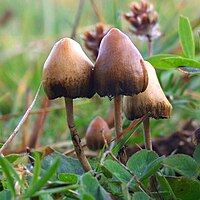Poster used to promote Ordinance 301. In May 2019, Denver became the first U.S. city to decriminalize psilocybin.
The movement to decriminalize psilocybin in the United States began in the late 2010s, with Denver, Colorado, becoming the first city to decriminalize psilocybin in May 2019. The cities of Oakland and Santa Cruz, California,
followed suit and decriminalized psilocybin in June 2019 and January
2020, respectively. Supporters of the movement have cited emerging
research that indicate potential medical use for the drug. The use,
sale, and possession of psilocybin in the United States, despite state
laws, is illegal under federal law.
Background
Psilocybe semilanceata, a psilocybin mushroom species commonly sold in the United States.
Psilocybin is a psychedelic drug produced naturally by psilocybin mushrooms, commonly known as "magic mushrooms". In the United States, it is federally classified as a Schedule I controlled substance that has "no accepted medical use and a high potential for abuse." The drug was banned by the 1970 Controlled Substances Act. In February 2019, Troy Farah of Wired reported on two grassroots movements in Oregon and the city of Denver, Colorado, that were pushing for the decriminalization of psilocybin. Advocates for decriminalizing psilocybin have formed their movement based on the rapid legalization of cannabis in the United States. Decriminalization efforts have not included synthetic psychedelics such as lysergic acid diethylamide (LSD) and MDMA.
In May 2018, President Donald Trump signed the Right to Try Act, with certain doctors suggesting that it allows terminally-ill patients to use psychedelics for treatment. In October 2018, the Food and Drug Administration granted psilocybin "breakthrough therapy" status for research. The drug was granted this status again in November 2019.
Decriminalization advocates have cited research that suggests that the
drug is non-addictive and causes a low amount of emergency visits when
compared to other illegal drugs. Other research has indicated the potential beneficial use of psilocybin in treating treatment-resistant depression and nicotine dependence. Advocates have also claimed that decriminalization would lift law enforcement resources to focus on high-priority issues.
American author Michael Pollan, writing for The New York Times,
criticized the movement for being a premature push while research on
psilocybin was not done. He wrote, "We still have a lot to learn about
the immense power and potential risk of these molecules, not to mention
the consequences of unrestricted use." Pollan acknowledged the low-risks
of the drug's use, but cited a survey that nearly eight percent of
people needed psychiatric treatment after experiencing a bad trip.
Decriminalization
Legality of psilocybin in the United States
Decriminalized cities
States with decriminalized cities
Prohibited for any use
As of May 2020, three cities have decriminalized psilocybin. In May
2020, Ordinance 301 narrowly passed in Denver with 50.6% voting in
favor. The following month, thirty individuals testified to the city council in Oakland, California,
about their prior experiences with psilocybin. Following the
testimonies, the city council unanimously voted to decriminalize the
drug, along with peyote. In January 2020, Santa Cruz, California, voted unanimously to decriminalize the adult possession and cultivation of psilocybin. Commercial sale of psilocybin is still illegal.
Ongoing efforts
A 2018 effort to decriminalize psilocybin in California failed to garner enough signatures. In February 2019, Iowa
state lawmaker Jeff Shipley introduced two bills that would legalize
medical psilocybin and remove the drug from the state's list of
controlled substances. In June 2019, Representative Alexandria Ocasio-Cortez proposed legislation that would remove restrictions placed on researching the medical use of psilocybin. By November 2019, nearly 100 U.S. cities were reportedly considering measures to decriminalize psilocybin.
In January 2020, a Vermont state lawmaker, along with three other co-sponsors, introduced a bill to decriminalize psilocybin, peyote, ayahuasca, and kratom. In February 2020, the Board of Elections in Washington, D.C., decided to allow a vote on decriminalization in November of that year if organizers could collect enough signatures in time.
On May 26, 2020, an initiative in Oregon to legalize medical psilocybin
qualified to appear on the ballot in November. Another initiative in
Oregon would decriminalize drug possession and expand treatment
services. In May 2020, New York Assemblywoman Linda Rosenthal introduced a decriminalization bill, citing ongoing medical research and successful efforts in Denver, Oakland, and Santa Cruz.
Public opinion
In January 2019, the Oregon Psilocybin Society
and research firm DHM Research found that 47 percent of Oregon voters
approved the legalization of medical psilocybin, while 46 percent
opposed. The percentage of voters in favor increased to 64 percent after
key elements of the ballot were clarified to the poll's participants.
An October 2019 online poll conducted by research firm Green Horizons
found that 38 percent of U.S. adults supported legalizing psilocybin
"under at least some circumstances."



